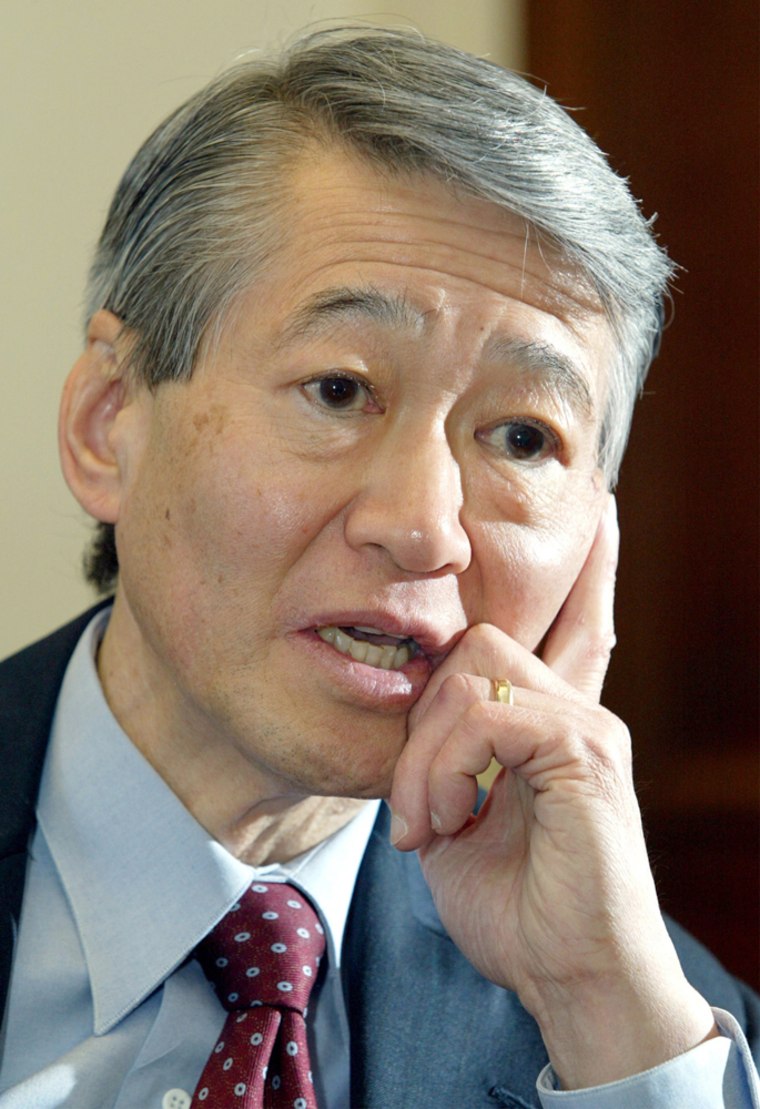Rep. Robert T. Matsui of California, who spent time in an internment camp for Japanese-Americans as an infant during World War II and went on to serve 26 years in Congress, has died of complications from a rare disease, his family said Sunday.
The 63-year-old died Saturday night at the National Naval Medical Center in Bethesda, Md., outside Washington.
Matsui was the third-ranking Democrat on the powerful House Ways and Means Committee, where he was his party’s point man on Social Security legislation. He also recently chaired the Democratic Congressional Campaign Committee, where he led the party’s unsuccessful effort to regain control of the House.
In a statement announcing Matsui’s death, his office said the congressman had been diagnosed several months ago with myelodysplastic disorder, an often-fatal form of bone marrow cancer. The congressman’s family said he entered the hospital on Dec. 24 with pneumonia.
Word of Matsui’s death prompted an outpouring of remembrances from Washington and California political figures, including President Bush.
'Good and decent man'
“Bob Matsui was a dedicated public servant and a good and decent man who served with distinction and integrity in the U.S. House of Representatives,” Bush said.
Sen. Barbara Boxer, D-Calif., said Matsui was a “part of my political life for more than 20 years, and he represented the best in politics.” Sen. Dianne Feinstein, D-Calif., called him “a master of balanced, practical public policy.”
Matsui was re-elected with ease to his 14th term in November. His wife, Doris, was until 1998 a deputy director of public liaison in the Clinton White House.
Matsui was born in 1941. The following year, his family was among the Japanese-Americans forced into internment camps during World War II. Decades later, he helped pass legislation apologizing for the internment policy and providing compensation for the survivors.
“True believers in the freedom and justice of the American system, many internees simply could not believe that their country could do this to them,” Matsui said in a 1988 speech to the House in support of the legislation. “My own father could not even talk about his experience in the Tule Lake Internment Camp until 40 years after his freedom was returned to him.”
An attorney, Matsui became a Sacramento City Council member in 1971 and was elected to represent the capital area’s solidly Democratic fifth congressional district in 1978.
Former President Bill Clinton and his wife, Sen. Hillary Rodham Clinton, D-N.Y., said in a joint statement that Matsui “leaves behind a rich legacy of service that improved the lives of his own constituents, all Americans, and people throughout the world.”
House Speaker Dennis Hastert, R-Ill., said Matsui was “a passionate defender of his ideals, an energetic representative to his constituents and a man who brought dignity and honor to the House.”
Matsui generally backed Democratic legislation, but his support for global trade legislation put him at odds with members of his party on some high-profile measures.
Special election
As senior Democrat on the subcommittee on Social Security, Matsui had indicated in recent weeks that he was eager to lead the opposition to President Bush’s plans to establish personal retirement accounts as part of a general overhaul of the program.
Gov. Arnold Schwarzenegger will call a special election to fill Matsui’s seat. Analysts said Matsui’s successor will almost certainly be a Democrat, most likely a member of the Sacramento City Council or state lawmaker.
Matsui is survived by his wife and a son, Brian.
